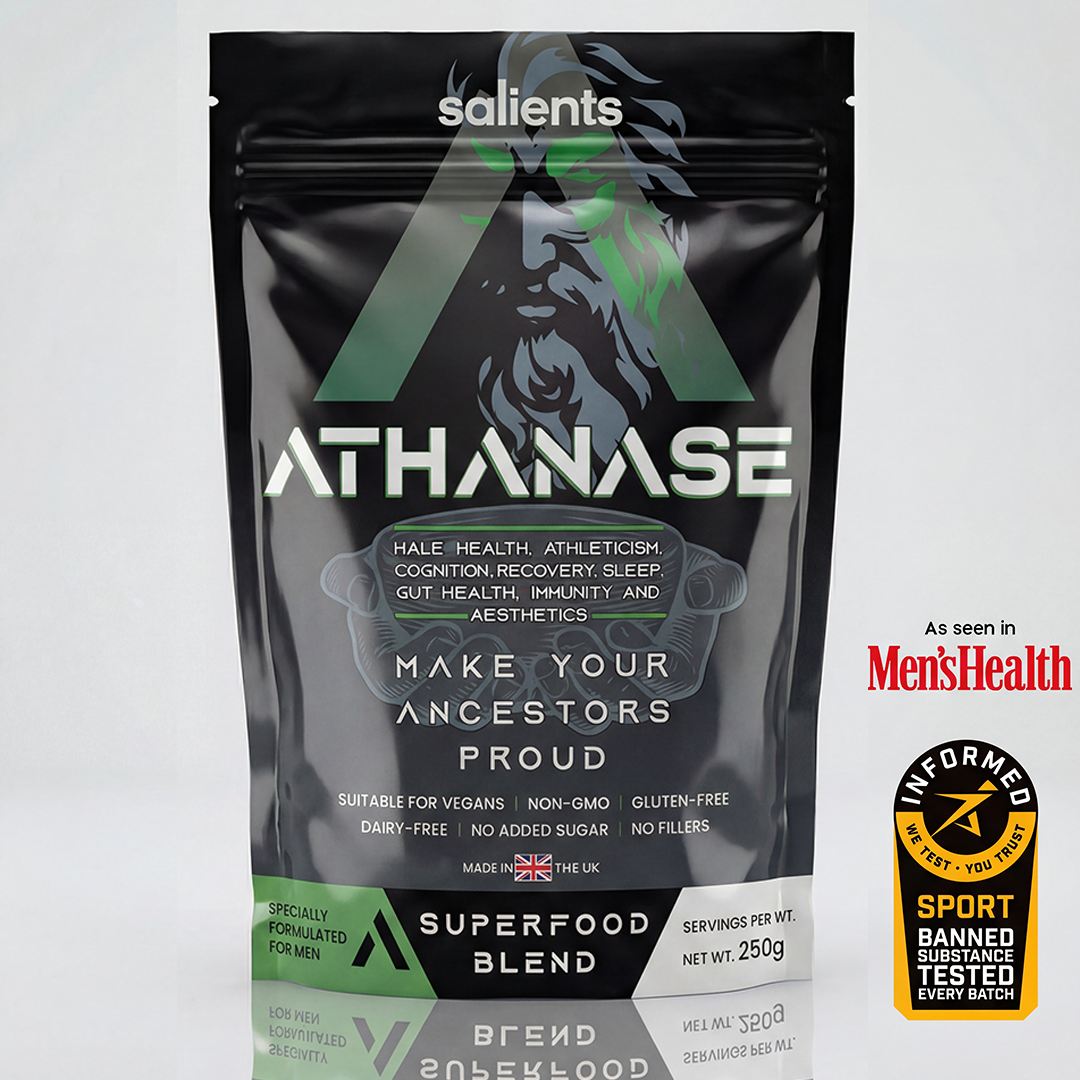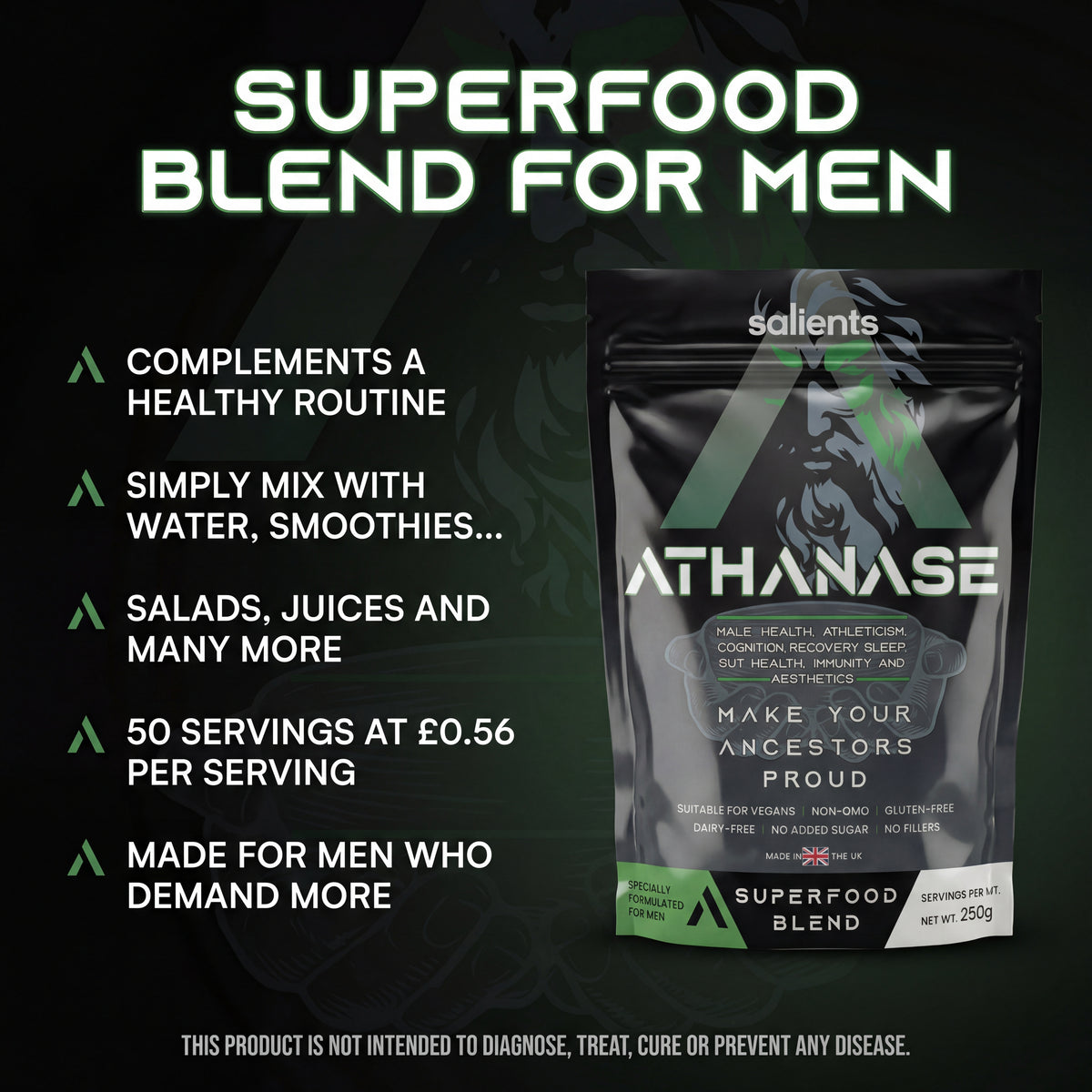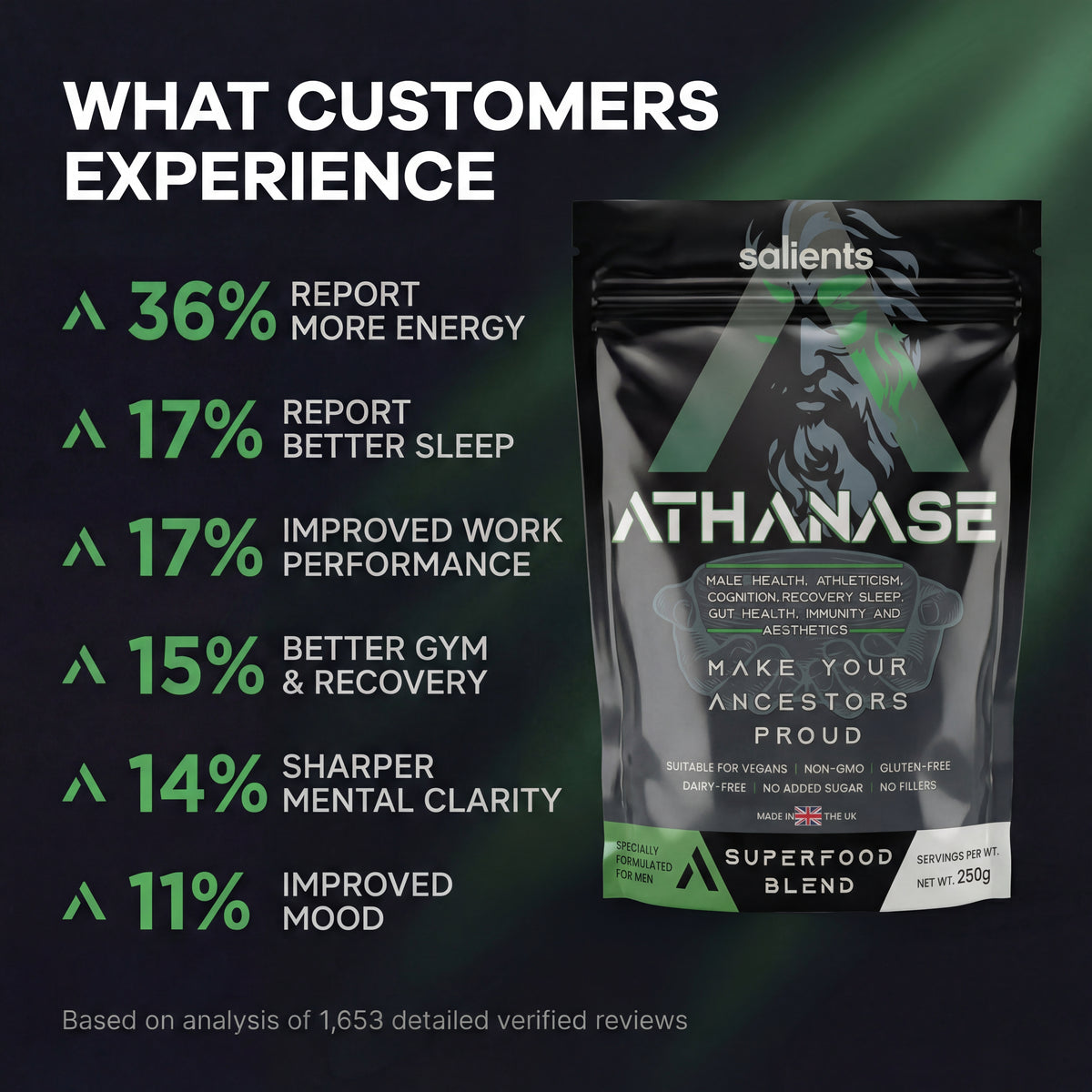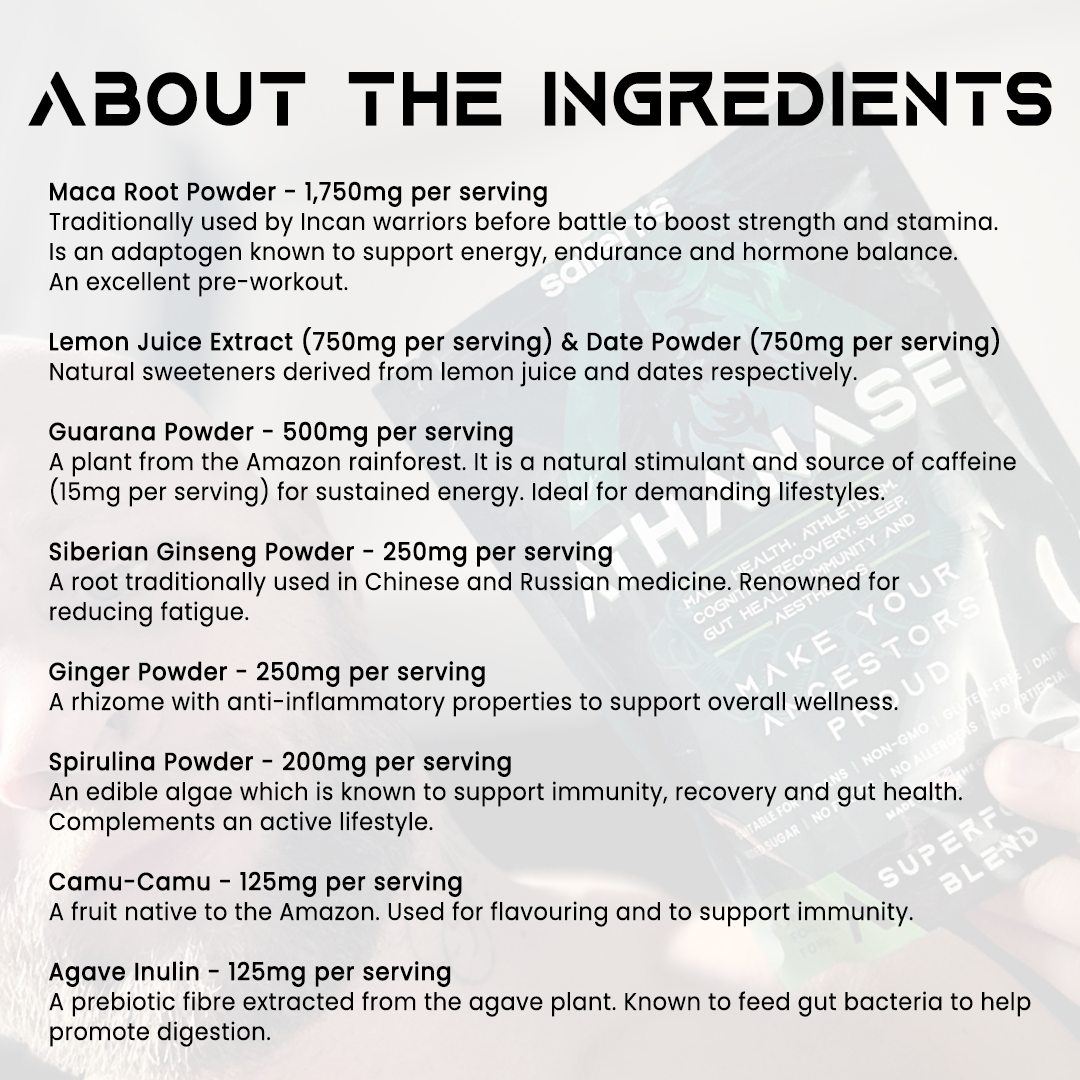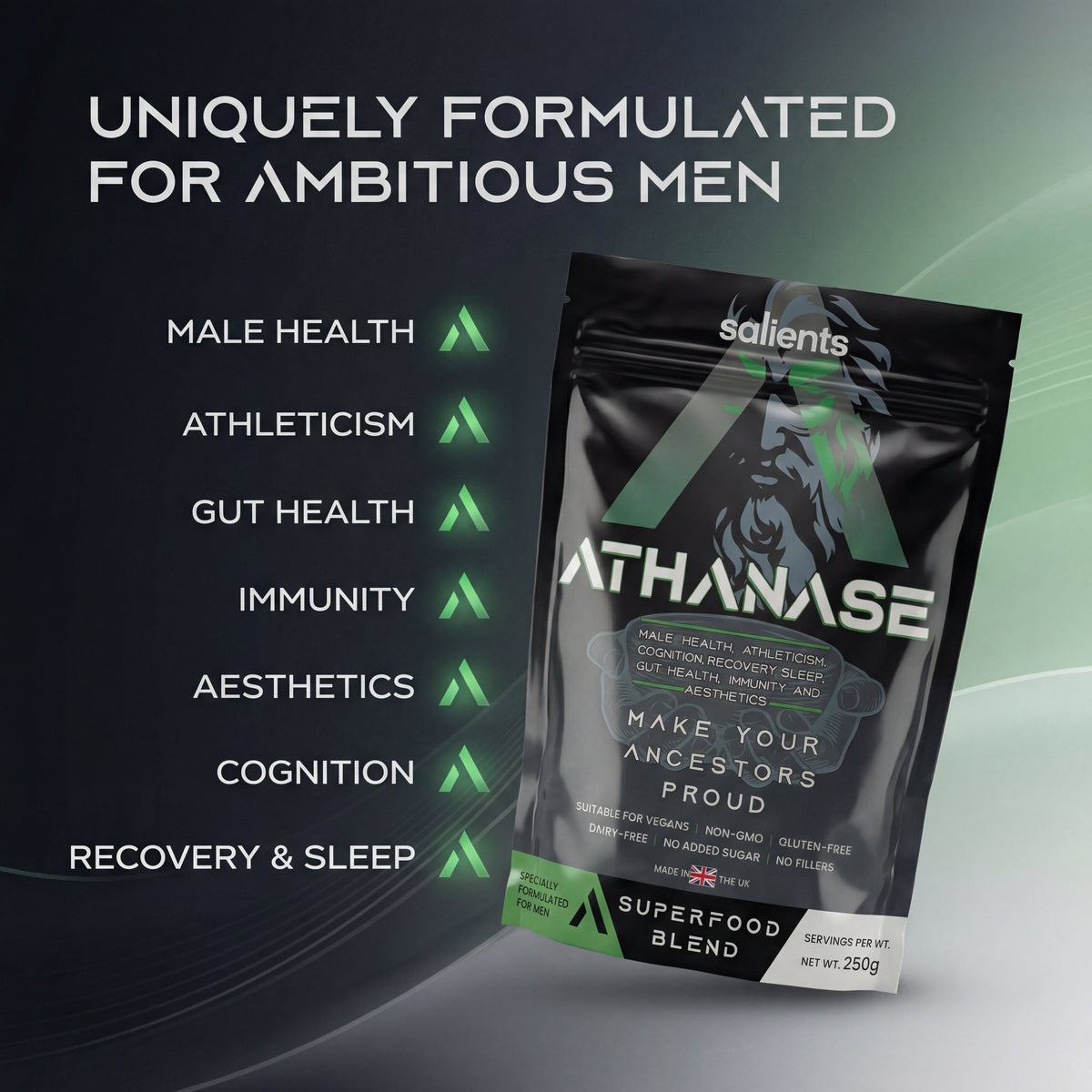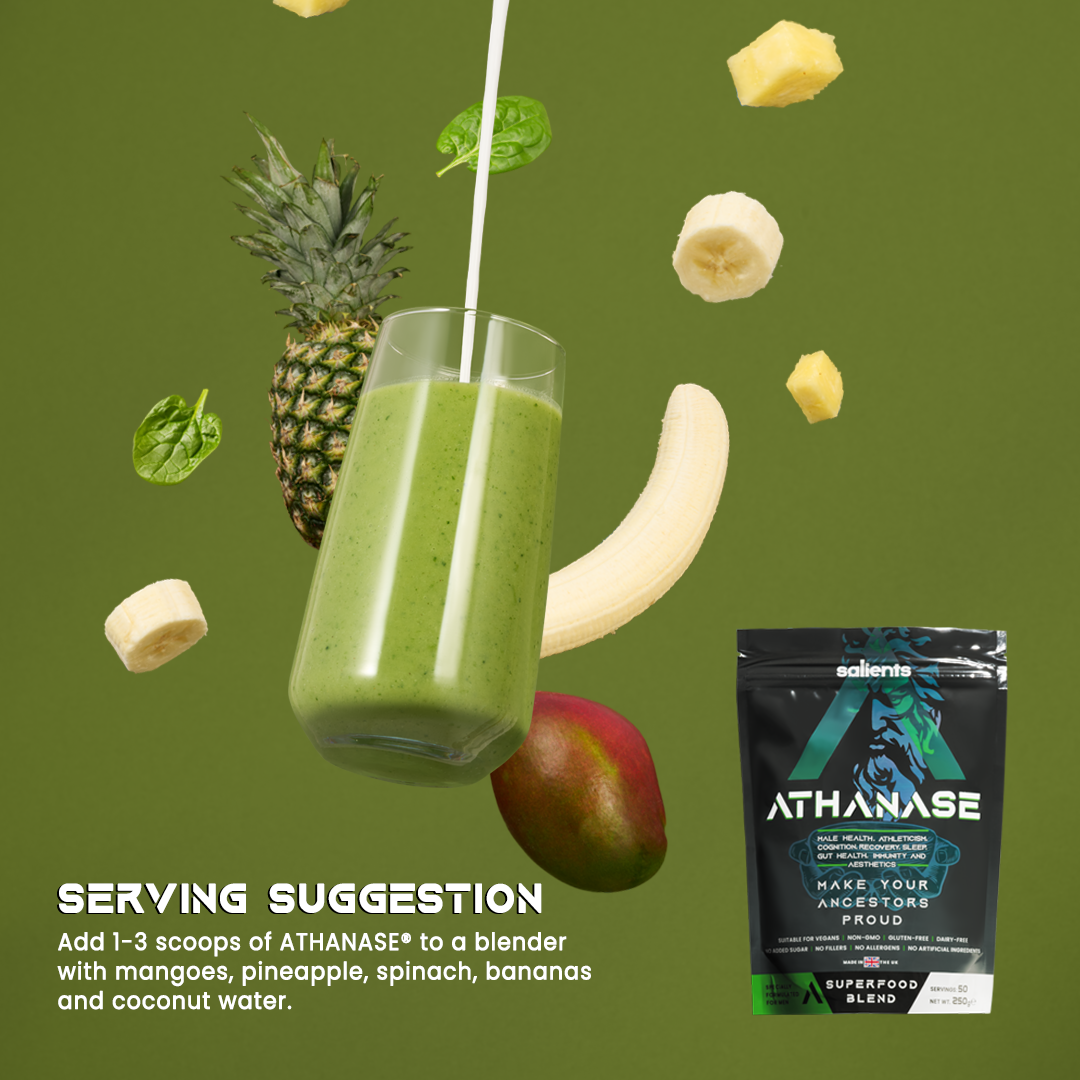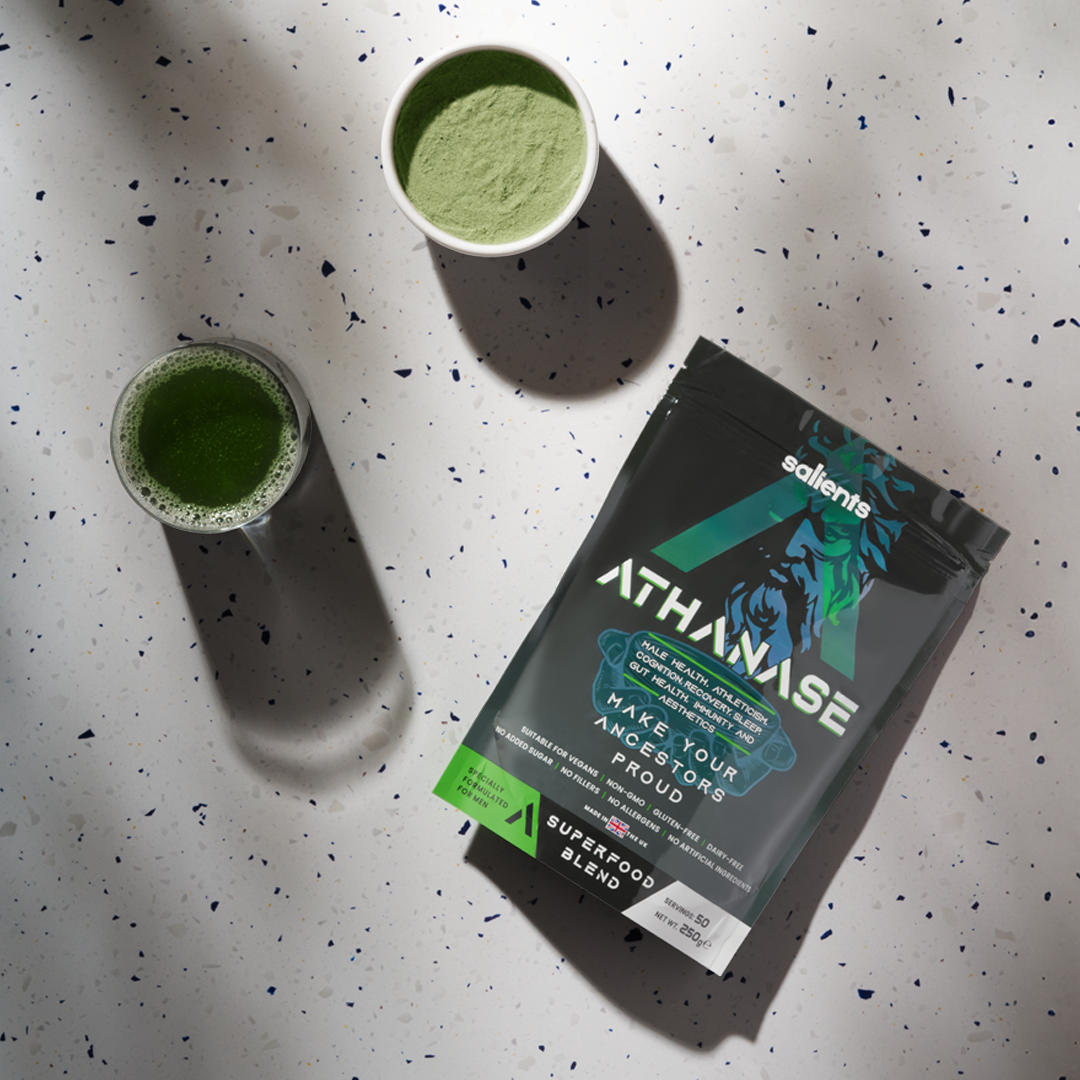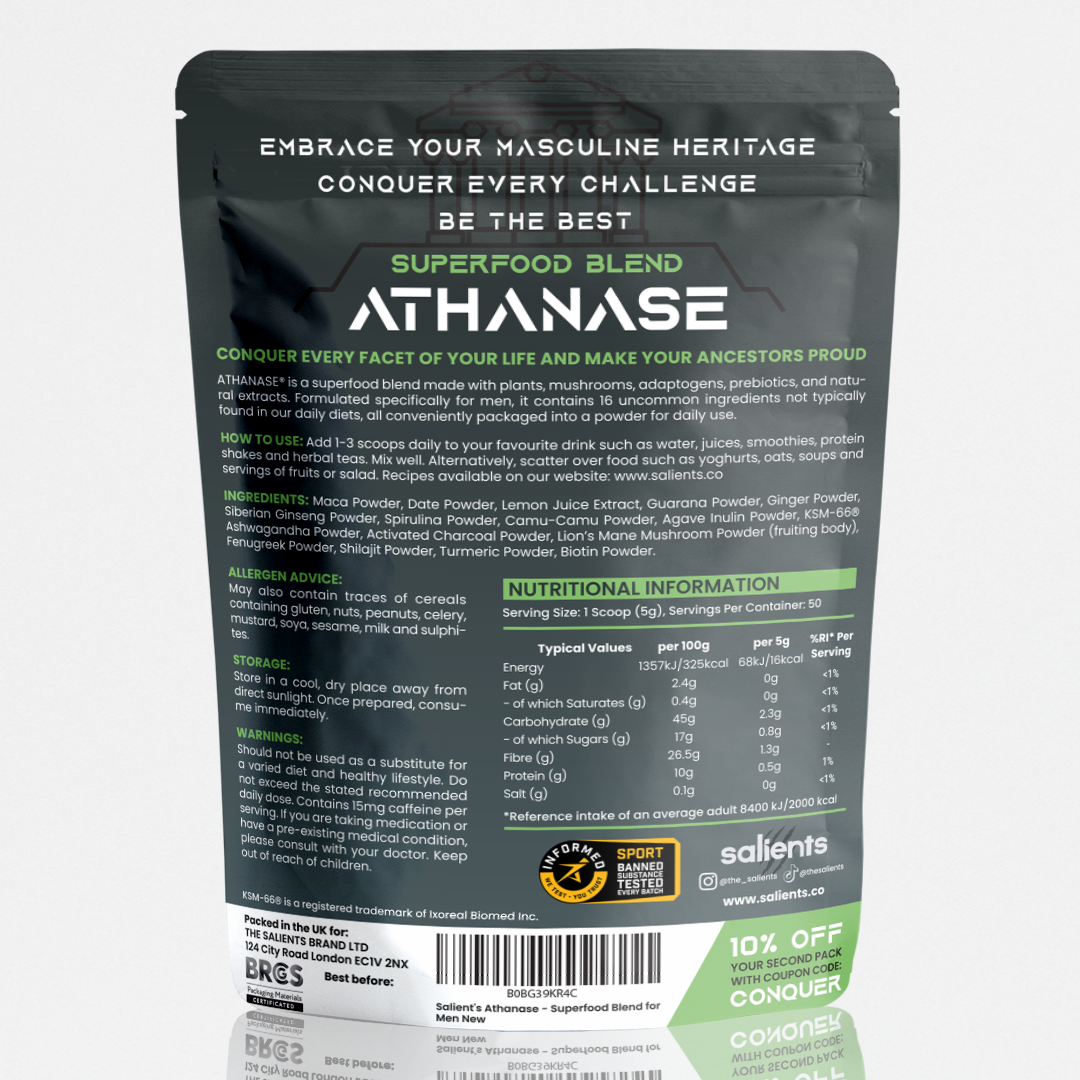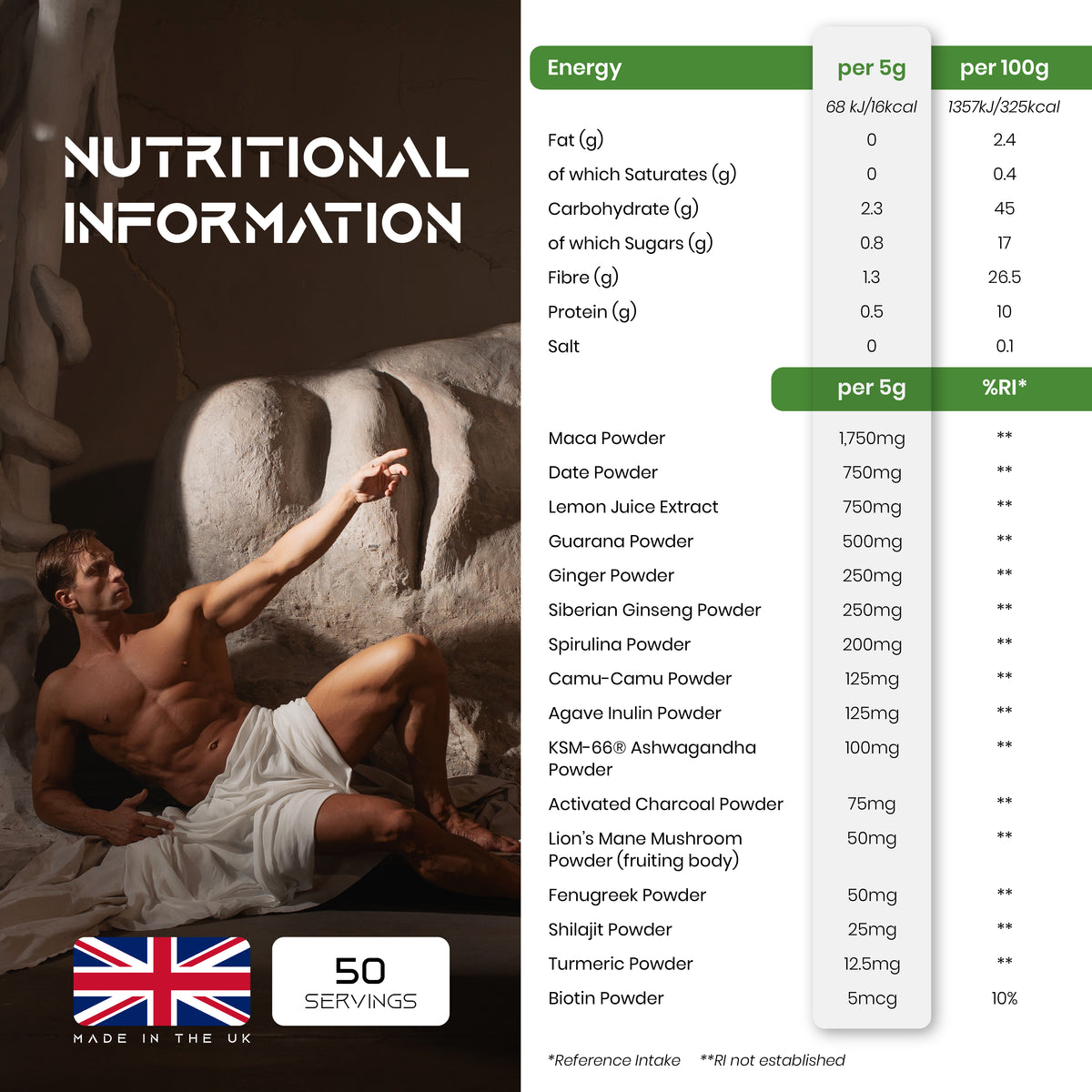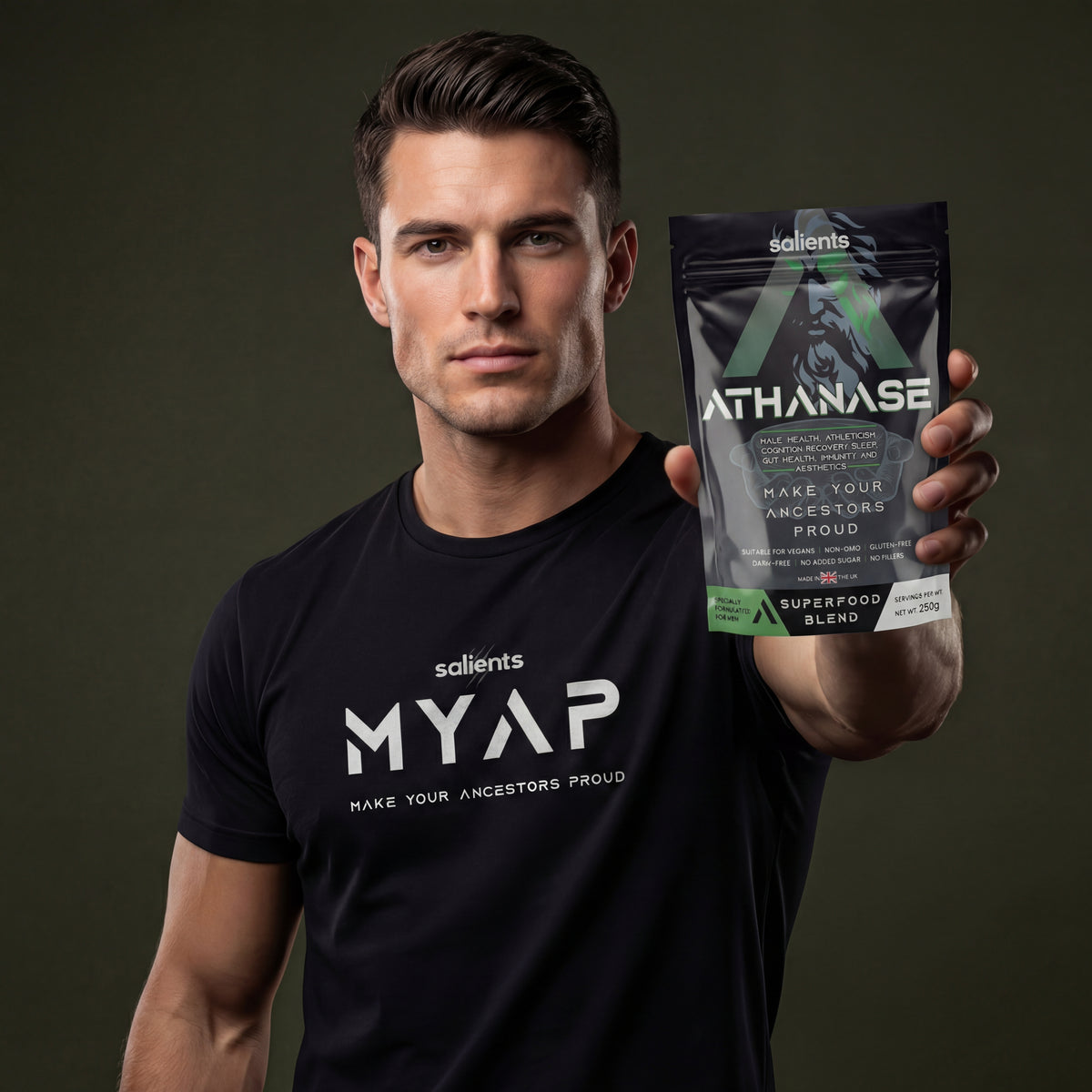Your Cart is Empty
Research Vault
Our Philosophy: ATHANASE® is formulated as a synergistic daily foundation — not a collection of isolated megadoses. Within each 5g serving, we've combined 16 carefully selected ingredients that work together to support male vitality across multiple pathways.
Below we provide third-party research studies for the ingredients in ATHANASE®. It is important to understand that ATHANASE® is a blend of herbs and is not scientifically proven as a complete formula.
Please note that whilst third-party research may be supportive, it is not conclusive. Nutrition is complex and everyone's body reacts differently. Studies have limitations including: sample size & species, study duration, form of food, preparation variation, dosage consistency, synergistic effects, bioavailability, individual variability, and placebo effects.
Before making dietary changes, we recommend consulting with your healthcare provider. To understand the impact of ATHANASE® on Saj, our founder, visit our results page.
We publish both positive and critical reviews. Read them on our review page (2,200+ verified reviews, 86% 5-star rating).
Evidence Summary at a Glance
You may wish to rotate your phone for an easier viewing experience.| Ingredient | Evidence Quality | ATHANASE Dose | Primary Benefit |
|---|---|---|---|
| Maca Root | Strong | 1,750mg ✓ | Sexual function, libido, vitality |
| Lemon Juice Extract | Low | 750mg ✓ | Vitamin C, digestion, alkalinity |
| Date Powder | Low | 750mg ✓ | Natural energy, fibre, minerals |
| Guarana | Good | 500mg ✓ | Cognitive performance, sustained energy |
| Ginger | Strong | 250mg ✓ | Anti-inflammatory, recovery, digestion |
| Siberian Ginseng | Moderate | 250mg ✓ | Adaptogenic support, endurance |
| Spirulina | Moderate | 200mg * | Immune support, antioxidant |
| Camu Camu | Low | 125mg | Natural vitamin C, antioxidant |
| Agave Inulin | Strong | 125mg * | Prebiotic gut support |
| KSM-66 Ashwagandha | Strong | 100mg * | Stress, cortisol, testosterone support |
| Activated Charcoal | Low | 75mg * | Detox support, reduces bloating |
| Fenugreek | Strong | 50mg * | Testosterone support |
| Lion's Mane | Moderate | 50mg * | Cognitive support, NGF stimulation |
| Shilajit | Low | 25mg * | Testosterone, mineral support |
| Turmeric | Strong | 12.5mg * | Joint health, anti-inflammatory |
| Biotin | Moderate | 5mcg ✓ | Hair, skin, nails |
Key: ✓ = At or near clinical dose | * = Included at lower doses than standalone studies, for complementary support(5g serving constraint)
Detailed Research by Ingredient
Maca Root (1,750mg) — Foundation Ingredient
Sexual Function & Libido: Maca is one of the most well-researched ingredients in ATHANASE. A 2010 systematic review of 4 RCTs (n=131) found significant positive effects on sexual desire and erectile function. A 2023 RCT (n=80) demonstrated significant improvements in Aging Males' Symptoms scale (AMS), IIEF, and IPSS scores versus placebo (p<0.05). A 2023 meta-analysis confirmed positive effects on erectile function in men with mild ED (MD 1.13, p<0.01).
Shin, B. C., et al. (2010). Maca for improving sexual function: a systematic review. BMC Complementary Medicine, 10, 44.
Kim, S. W., et al. (2023). Efficacy and Safety of Maca in Patients with Late-Onset Hypogonadism. World Journal of Men's Health, 41(3), 692-700.
Jang, D. J., et al. (2023). Maca for erectile dysfunction: a systematic review and meta-analysis. JOMH, 15305.
Energy & Endurance: Traditionally used by Incan warriors before battle, maca has adaptogenic properties that help the body manage physical and mental stress. A 2024 study confirmed maca's effectiveness in treating andropause symptoms in men, noting it serves as a promising alternative therapy for individuals who cannot receive testosterone treatment.
Kim, W. I., et al. (2024). Effects of gelatinized maca on andropause symptoms. Int J Pharmacol, 20(4), 622-629.
Gonzales, G. F. (2012). Ethnobiology and ethnopharmacology of Lepidium meyenii (Maca). Evidence-Based Complementary and Alternative Medicine.
How it works: Maca's benefits operate through non-hormonal pathways, likely involving the hypothalamic-pituitary axis and unique compounds called macamides. Multiple studies confirm no changes in serum testosterone levels — which actually makes it a safer, natural option that doesn't directly manipulate hormone levels.
Guarana (500mg)
Cognitive Performance: A 2023 meta-analysis of 8 studies (n=328) found guarana significantly improves reaction time (g=0.202, p=0.005). Importantly, research shows these cognitive benefits extend beyond caffeine content alone, suggesting synergistic compounds in the whole plant.
Hack, B., et al. (2023). Effect of Guarana on Cognitive Performance: Systematic Review and Meta-Analysis. Nutrients, 15(2), 434.
Kennedy, D. O., et al. (2004). Low caffeine doses (9mg in 75mg guarana) showed psychoactive effects, suggesting non-caffeine compounds contribute to benefits.
Sustained energy: Unlike coffee, guarana releases caffeine more gradually, providing sustained alertness without the crash. ATHANASE contains just 15mg of natural caffeine from guarana — less than a quarter of a typical coffee.
KSM-66® Ashwagandha (100mg)
Stress & Cortisol Management: KSM-66 is the most clinically studied ashwagandha extract. A 2025 systematic review and meta-analysis (15 studies, n=873) found ashwagandha significantly reduced anxiety (HAM-A), stress (PSS), and cortisol levels (p<0.0001 at 8 weeks). The landmark 2012 RCT (n=64) demonstrated a 27.9% reduction in serum cortisol versus just 7.9% in the placebo group (p=0.002).
BJPsych Open (2025). Effects of Ashwagandha Supplements on Cortisol, Stress, and Anxiety Levels in Adults: A Systematic Review and Meta-Analysis. 15 studies, n=873.
Chandrasekhar, K., et al. (2012). Safety and efficacy of ashwagandha root extract. Indian Journal of Psychological Medicine, 34(3), 255-262.
Arumugam, V., et al. (2024). Effects of Ashwagandha on stress and anxiety: A systematic review and meta-analysis. Explore, 20(6), 103062. [9 RCTs, n=558]
Testosterone & Training: Multiple RCTs demonstrate ashwagandha supports healthy testosterone levels. A 2019 crossover study found an 18% greater increase in DHEA-S and 14.7% greater increase in testosterone compared to placebo (p<0.01). A 2025 comprehensive review confirms ashwagandha's positive effects on testosterone, muscle strength, and recovery.
Lopresti, A. L., et al. (2019). Hormonal and Vitality Effects of Ashwagandha in Aging, Overweight Males. Am J Mens Health, 13(2).
Wankhede, S., et al. (2015). Resistance training with KSM-66: 600mg/day showed +96 ng/dL testosterone increase vs +18 ng/dL placebo (p=0.004)
Nutr Metab (2025). Withania somnifera supplementation: mechanisms, health benefits, and sports performance. Comprehensive review.
Note: ATHANASE uses 100mg as part of a multi-ingredient formula. Most standalone studies use 300-600mg. We've balanced this with other synergistic adaptogens in the blend.
Ginger (250mg)
Anti-Inflammatory & Recovery: A 2020 meta-analysis (16 RCTs, n=1,010) confirmed ginger significantly reduces inflammatory markers: CRP (p<0.001), TNF-α (p<0.05), and hs-CRP (p<0.05). A 2025 RCT found that even low-dose ginger (125mg/day) attenuated muscle pain, improved functional capacity, and reduced IL-6, TNF-α, and CRP levels.
Morvaridzadeh, M., et al. (2020). Effect of ginger on inflammatory markers: A systematic review and meta-analysis of RCTs. Cytokine, 135:155224.
Texas A&M (2025). Effects of Ginger Supplementation on Markers of Inflammation and Functional Capacity. Nutrients, 17(14), 2365.
Jalali, M., et al. (2020). Effects of ginger on inflammatory and oxidative stress markers: Systematic review and meta-analysis. [25 studies, effects more pronounced with >80 days duration]
Pain Relief: Clinical evidence shows ginger is effective in the treatment of inflammation and is comparable to NSAIDs, but has fewer side effects, particularly concerning the gastrointestinal tract. One RCT (n=60) found ginger as effective as ibuprofen for pain management.
Rayati, F., et al. (2017). Ginger vs ibuprofen in postsurgical pain. Dental Research Journal, 14(1), 1-7.
Rondanelli, M., et al. (2020). Clinical trials on pain lowering effect of ginger: A narrative review. Phytotherapy Research.
Fenugreek (50mg)
Testosterone Support: A 2023 meta-analysis of 7 studies (n=449) confirmed fenugreek has a significant effect on total testosterone (SMD: 0.32, p<0.05). A 2024 RCT (n=95, men 40-80 years) showed 13% increase in plasma testosterone and 16.3% increase in free testosterone index over 12 weeks (p<0.0001).
Isenmann, E., et al. (2023). The Anabolic Effect of Fenugreek: Systematic Review with Meta-analysis. Int J Sports Med, 44(10), 692-703.
Lee-Ødegård, S., et al. (2024). Effect of fenugreek extract on testosterone in blood plasma and saliva. PLoS ONE, 19(9), e0310170.
Wankhede, S., et al. (2016). Fenugreek glycoside supplementation during resistance training. JSHS, 5, 176-182. [RCT, n=60: 300mg twice daily increased free testosterone]
Mechanism: Fenugreek works through aromatase and 5α-reductase inhibition, helping maintain testosterone levels naturally. ATHANASE includes a foundational dose as part of the synergistic blend.
Shilajit (25mg)
The "Destroyer of Weakness": This Himalayan mineral resin has been used in Ayurvedic medicine for centuries. An RCT (n=75, men 45-55 years) found 90 days of supplementation increased total testosterone by 20%, free testosterone by 19%, and DHEAS by 31% versus placebo (p<0.05).
Pandit, S., et al. (2016). Clinical evaluation of purified Shilajit on testosterone levels. Andrologia, 48(5), 570-575.
Keller, J. L., et al. (2019). Shilajit supplementation promoted retention of muscular strength, decreased collagen degradation marker by 29%. JISSN, 16(1), 3.
Turmeric (12.5mg)
Joint Health & Inflammation: Curcumin (turmeric's active compound) is one of the most researched natural anti-inflammatories. A 2024 umbrella meta-analysis of meta-analyses confirmed significant pain reduction in osteoarthritis, with efficacy comparable to NSAIDs and a superior safety profile.
Bideshki, M. V., et al. (2024). The efficacy of curcumin in relieving osteoarthritis: A meta-analysis of meta-analyses. Phytotherapy Research, 38(6), 2875-2891.
Note: ATHANASE includes turmeric as part of the overall anti-inflammatory profile of the blend. For targeted joint support, higher doses or enhanced-bioavailability formulations may be beneficial.
Lion's Mane Mushroom (50mg)
Cognitive Support: Lion's mane contains unique compounds (hericenones and erinacines) that stimulate Nerve Growth Factor (NGF) production. A 2023 pilot study (n=41) found improved cognitive task performance (p=0.005) and a trend toward reduced stress. A 2025 systematic review confirmed cognitive benefits in populations with mild cognitive impairment.
Docherty, S., et al. (2023). Effects of Lion's mane on cognitive function in young adults. Nutrients, 15(22), 4842.
Mori, K., et al. (2009). Improving effects on mild cognitive impairment. Phytotherapy Research, 23(3), 367-372.
Frontiers in Nutrition (2025). Benefits, side effects, and uses of Hericium erinaceus: a systematic review. [26 studies, MMSE scores improved by weighted mean of 1.17]
Siberian Ginseng (250mg)
Adaptogenic Support: Used extensively in traditional Chinese and Russian medicine, Siberian ginseng (Eleutherococcus senticosus) is an adaptogen that helps the body cope with physical and mental stress. Over 1,000 studies have examined its effects on fatigue, cognitive function, and endurance.
Shikov, A. N., et al. (2021). Review of eleutherococcus studies: Benefits for cognitive function and physical/mental endurance.
Spirulina (200mg)
Immune Support & Antioxidant: This nutrient-dense blue-green algae has been shown to enhance natural killer cell activity, increase IFN-gamma production, and support beneficial gut bacteria. A 2024 critical review confirms its effects on gut microbiota composition and immune function.
Hirahashi, T., et al. (2002). Activation of innate immune system by Spirulina. Int Immunopharmacol, 2(4), 423-434.
de Brito Alves, J. L., et al. (2024). Spirulina and gut microbiota health benefits. Critical Reviews in Food Science and Nutrition.
Camu Camu (125mg)
Nature's Vitamin C Powerhouse: This Amazonian superfruit contains up to 60x more vitamin C than oranges, plus synergistic antioxidants. Research shows camu camu reduces oxidative stress more effectively than synthetic vitamin C alone, likely due to its unique combination of anthocyanins, ellagic acid, and flavonoids.
Inoue, T., et al. (2008). Camu-camu anti-oxidative and anti-inflammatory properties. Journal of Cardiology, 52(2), 127-132.
Agave Inulin (125mg)
Prebiotic Gut Support: Inulin is a well-established prebiotic fiber that feeds beneficial gut bacteria. Systematic reviews confirm it consistently increases Bifidobacterium and produces short-chain fatty acids that support digestive and immune health.
Le Bastard, Q., et al. (2020). Systematic review: Inulin effects on gut microbiota composition. [9 studies: increased Bifidobacterium, Anaerostipes, Faecalibacterium, Lactobacillus]
Our Formulation Philosophy
ATHANASE is designed as a daily foundation, not a megadose supplement. Within our 5g serving, we've prioritised:
- Synergy over isolation: Multiple ingredients working together across different pathways
- Whole-food ingredients: Natural extracts and powders rather than synthetic isolates
- Daily sustainability: Safe for long-term daily use without cycling
- Broad coverage: Supporting male health, energy, cognition, recovery, gut health, immunity, and aesthetics
For those seeking targeted, high-dose supplementation for specific concerns, standalone products may complement ATHANASE. Our formula is designed to provide a comprehensive daily base that covers multiple aspects of male vitality in one convenient serving.
Our Commitment to Transparency
We believe you deserve to know exactly what's in your supplements and why. That's why we:
- Publish full ingredient amounts (no proprietary blends)
- Provide Certificates of Analysis for every batch
- Are Informed Sport certified (banned substance tested)
- Present research with full citations so you can verify claims yourself
Key Findings from 2,200+ Customer Reviews
Our customers consistently report improvements across five main areas:
Energy & Alertness
"More energy than ever" · "Feel more alive & more energised" · "No afternoon slump"
"More energy than ever" · "Feel more alive & more energised" · "No afternoon slump"
Mental Clarity & Focus
"Head's a lot clearer and I feel more focused throughout the day" · "Brain fog gone"
"Head's a lot clearer and I feel more focused throughout the day" · "Brain fog gone"
Sleep Quality
"Sleeping through the night" · "Great sleep" · "Wake up feeling refreshed"
"Sleeping through the night" · "Great sleep" · "Wake up feeling refreshed"
Training & Recovery
"Energy levels and strength in the gym have definitely increased" · "Better recovery"
"Energy levels and strength in the gym have definitely increased" · "Better recovery"
Overall Wellbeing
"Feel the difference in energy, calmness and all round general wellness"
"Feel the difference in energy, calmness and all round general wellness"
Based on 2,200+ verified reviews (86% 5-star). We publish both positive and critical reviews — read them all on our review page.



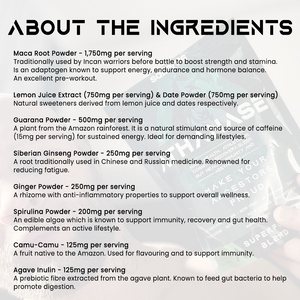





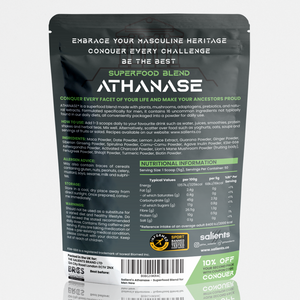
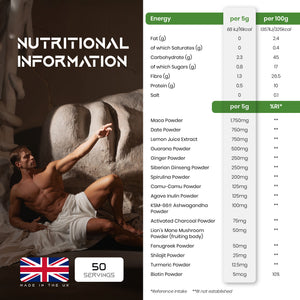
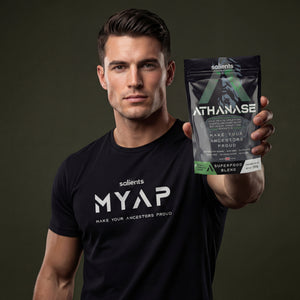



£28.00
MAKE YOUR ANCESTORS PROUD® with ATHANASE®. A blend of herbs specially formulated for men, to help conquer 7 areas:
| |
MALE HEALTH |
| |
ATHLETICISM |
| |
MOOD & COGNITION |
| |
RECOVERY & SLEEP |
| |
GUT HEALTH |
| |
IMMUNITY |
| |
AESTHETICS |
As seen in Men's Health Magazine and Certified by Informed Sport.
Select a purchase option to pre order this product
Countdown header

